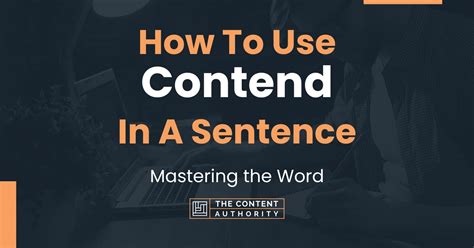Contend, a versatile verb meaning “to assert or maintain strongly,” plays a pivotal role in the realm of debate and argumentation. Its skillful use enables writers and speakers to convey their viewpoints with precision and persuasiveness.

Understanding the Nuances of “Contend”
“Contend” is often used in contexts where there is a disagreement or difference of opinion. It implies a strong conviction in one’s position and a willingness to engage in discussion or debate to support it.
Examples of Contend in a Sentence
To better grasp the versatility of “contend,” consider the following examples:
- Philosophers contend that the search for knowledge is an ongoing human endeavor.
- Economists contend that government intervention in the free market can have unintended consequences.
- Scientists contend that climate change is a pressing global issue that requires urgent action.
- Lawyers contend that their client is innocent of the charges against them.
- Politicians contend that their policies will improve the lives of their constituents.
- Historians contend that the American Revolution was not solely a fight for independence but also a struggle for social justice.
- Environmentalists contend that protecting biodiversity is crucial for the health of the planet.
- Artists contend that art has the power to inspire, provoke, and heal.
- Educators contend that every child deserves access to quality education.
- Researchers contend that artificial intelligence has the potential to transform society in profound ways.
Benefits of Using Contend
Contend offers numerous benefits for effective communication. It:
- Expresses strong convictions: Contend allows writers and speakers to assert their positions with confidence and authority.
- Encourages intellectual debate: By stating a strong opinion, contend invites others to engage in respectful discussion and debate, fostering critical thinking and intellectual growth.
- Provides a foundation for evidence: Contend invites the reader or listener to expect supporting evidence for the assertion being made, ensuring that arguments are well-reasoned and credible.
- Creates a compelling narrative: Contend can help writers and speakers craft compelling narratives by showcasing the strength and validity of their arguments.
- Enhances persuasion: By expressing a strong stance and providing supporting evidence, contend enhances the persuasiveness of arguments, leading to a greater likelihood of changing minds.
Common Mistakes to Avoid
While contend is a powerful tool, it can be misused if not handled carefully. Avoid the following pitfalls:
- Overstating claims: Contend should be used for assertions that are supported by evidence and reason, not for exaggerated or unfounded claims.
- Ignoring opposing viewpoints: Contend should not be used to dismiss or belittle opposing viewpoints. Instead, it should encourage respectful dialogue and consideration of alternative perspectives.
- Lack of supporting evidence: Contentions must be supported with credible evidence or reasoning. Assertions made without justification will weaken the argument’s credibility.
- Using inflammatory language: Contend should be used to present a clear and reasoned argument, not to engage in personal attacks or use inflammatory language that undermines the credibility of the speaker or writer.
- Confusing “contend” with “argue”: Contend and argue are often used interchangeably, but they have subtle differences. Contend implies a strong assertion, while argue suggests a more extended discussion or debate.
How to Contend Effectively
To contend effectively, follow these steps:
- State your position clearly: Start by stating your contention in a concise and unambiguous way.
- Provide supporting evidence: Offer evidence from credible sources, such as research studies, expert testimony, or statistical data, to support your assertion.
- Anticipate objections: Consider potential objections to your position and address them before they are raised.
- Engage in respectful dialogue: Be open to discussing alternative viewpoints and listening to opposing perspectives.
- Concede when necessary: If evidence suggests that your position is incorrect, be willing to acknowledge that and revise your contention.
Why Contend Matters
Contend plays a vital role in societal discourse. It:
- Promotes critical thinking: By engaging in contention, individuals are forced to examine their beliefs, question assumptions, and seek evidence to support their positions.
- Uncovers truth and fosters discovery: The process of contending with opposing viewpoints can lead to a deeper understanding of complex issues and the discovery of new truths.
- Facilitates constructive dialogue: Contend can open doors for respectful dialogue and collaboration, even among those with different perspectives.
- Enhances decision-making: By considering multiple viewpoints and engaging in reasoned contention, individuals and organizations can make more informed decisions.
- Strengthens democracy: Contend is essential for a healthy democracy, where citizens are free to express their opinions and engage in constructive debate.
Conclusion
Contend is a powerful verb that enables writers and speakers to express their convictions and engage in meaningful argumentation. By understanding its nuances, avoiding common pitfalls, and following best practices, individuals can use contend effectively to convey their viewpoints, promote critical thinking, and contribute to a more informed and democratic society.
